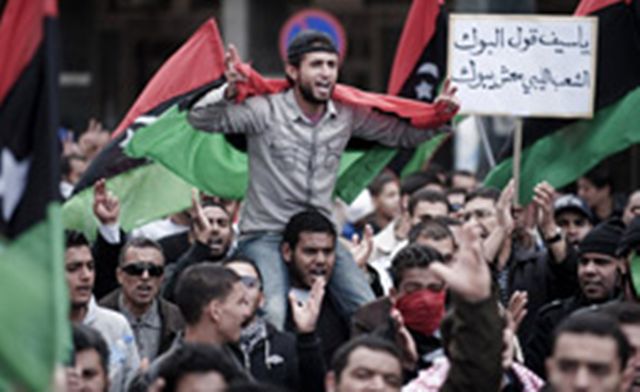
What Do the Uprisings in The Middle East Mean for al-Qaeda?
Publication: Terrorism Monitor Volume: 9 Issue: 11
By:

There are currently two arguments about what the recent uprisings across the Middle East mean for al-Qaeda. The optimists argue that non-violent revolutions in Tunisia and Egypt have stripped al-Qaeda’s narrative of its power. The pessimists counter that al-Qaeda is far from finished and will wait for the dust to settle, disappointment to set in, and the revolutionary spirit to turn bitter before it takes advantage of countries weakened by revolution. Perhaps, a better approach to this question is to be found in al-Qaeda’s strategic literature and its traditional relationship to each country in question.
Al-Qaeda represents a revolution within Islam. Its strategic literature recounts that Bin Laden commissioned a series of detailed regional studies to inform him about the best approach to jihadist revolution based on the facts of each case. Several years before 9/11, these studies were distributed among Bin Laden’s top advisers. [1] From this knowledge base, al-Qaeda’s leadership framed a flexible and opportunistic regional strategy that assigned operational priorities to countries based on the likelihood of success and the extent to which “global jihad” against the United States could be advanced by al-Qaeda’s involvement.
Those countries considered too hard to tackle directly were not abandoned entirely; instead al-Qaeda encouraged local jihadists to engage in terrorism against those governments without much outside help. Meanwhile al-Qaeda concentrated on attacking the United States and organizing al-Qaeda cells within top priority countries. The concept was that al-Qaeda would eventually come to the assistance of local jihadists in low-priority countries after success in high priority countries.
According to al-Qaeda strategist Abu Bakr Naji, the idea behind the movement’s prioritization was to avoid expending resources, even in important countries, without a clear return. [2] For example, Egypt, with almost 25% of the population of all the Arab League countries combined, has always been extremely important for al-Qaeda. Nevertheless, Mubarak’s Egypt is the prime example of a country in which al-Qaeda operations were considered too difficult. So Egypt was featured prominently in al-Qaeda’s propaganda and was the subject of multiple videos and three books written by Ayman al-Zawahiri, the latest of which appeared just 59 days before the first demonstrations in Tahrir Square. [3] However, al-Qaeda’s propaganda, which encouraged insurrection and terrorism, did not appeal to the Egyptian population. Internally, al-Qaeda used Egypt for lessons learned during the disastrous jihadist campaigns during the 1990s when other jihadist groups were virtually destroyed by Egyptian security forces.
Tunisia has been like a smaller version of Egypt for al-Qaeda. It was ruled by a strong central government, aided by powerful security forces. Tunisia experienced incidents of jihadist terrorism over the years, but al-Qaeda considered it an appropriate area for agitation and propaganda, rather than a target for its own operations. It was not considered a priority target for al-Qaeda.
After 9/11, Yemen, Saudi Arabia, and Pakistan were top priority countries in which al-Qaeda’s leadership arranged for jihadist networks to be funded and manned for guerrilla warfare. Al-Qaeda currently has well-established networks in Yemen and Pakistan. Non-Arab Pakistan marches to its own beat; its grave problems after the Arab uprisings are no different from before. Yemen has been influenced by the uprisings, but al-Qaeda’s local impact is negligible in comparison to powerful tribal and sectarian forces. Saudi Arabia has witnessed Shiite demonstrations and there are serious concerns that these could spread, but al-Qaeda exerts no influence on Shiite communities.
Libya was never a priority country for al-Qaeda. Its indigenous Libyan Islamic Fighting Group (LIFG) did ally itself to al-Qaeda in 2007, but was defeated by Gaddafi’s forces and by 2009 was essentially out of combat (for the LIFG, see Terrorism Monitor, May 5, 2005; November 3, 2005; June 18, 2009). Therefore, it was not in a position to support the recent uprisings and did not inspire the current Libyan opposition, whose public posture is incompatible with al-Qaeda’s doctrine. The West supports the opposition and appears to be trying to calibrate its response to avoid doing too much or too little, either of which could help al-Qaeda’s narrative. The ultimate outcome in Libya is difficult to gauge at this time, but so far, events there have not played to al-Qaeda’s advantage.
Even if one factors in Jordan, Iraq, and Algeria, it appears that al-Qaeda is in approximately the same position now as it was before the uprisings, with its regional appeal declining and its networks under severe pressure everywhere. This conclusion does not diminish the importance of uprisings across the Arab world. The significance of these uprisings, however, should not be judged using al-Qaeda as a metric; each has its own internal logic and history. In the end, if only the Egyptian and Tunisian revolutions prove successful, a major part of the Arab world will have unfurled the banner of modernization and democracy in a culturally acceptable model, which could become a new beacon for a large part of the Arab Middle East. In the meantime, local forces in places that experienced uprisings will continue to trump al-Qaeda’s transnational narrative. In the longer term, if none of these uprisings improve the lot of their people, al-Qaeda, an organization still capable of doing great damage, will be looking for new opportunities.
Notes:
1. The author of these studies was Syrian jihad strategist Abu Mus’ab al-Suri.
2. Abu Bakr Naji, Idarat al-Tawahush (The Management of Savagery), p. 15. Naji’s work as translated by William McCants may be downloaded from: https://www.wcfia.harvard.edu/olin/images/Management%20of%20Savagery%20-%2005-23-2006.pdf . The Arabic version is available at: https://www.tawhed.ws/a?a=chr3ofzr . For commentary on his work, see Terrorism Focus, March 17, 2005; Terrorism Monitor, September 10, 2009.
3. Ayman al-Zawahiri, Knights Under the Prophet’s Banner (in Arabic) 2nd edition, Sahab Media, November 27, 2010.





